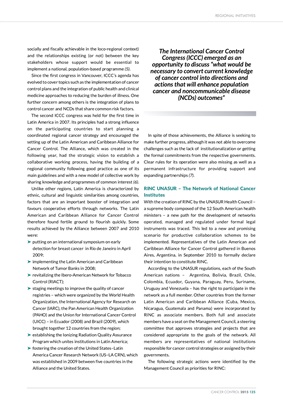
socially and fiscally achievable in the loco-regional context)
and the relationships existing (or not) between the key
stakeholders whose support would be essential to
implement a national, population-based programme (5).
Since the first congress in Vancouver, ICCC's agenda has
evolved to cover topics such as the implementation of cancer
control plans and the integration of public health and clinical
medicine approaches to reducing the burden of illness. One
further concern among others is the integration of plans to
control cancer and NCDs that share common risk factors.
The second ICCC congress was held for the first time in
Latin America in 2007. Its principles had a strong influence
on the participating countries to start planning a
coordinated regional cancer strategy and encouraged the
setting up of the Latin American and Caribbean Alliance for
Cancer Control. The Alliance, which was created in the
following year, had the strategic vision to establish a
collaborative working process, having the building of a
regional community following good practice as one of its
main guidelines and with a new model of collective work by
sharing knowledge and programmes of common interest (6).
Unlike other regions, Latin America is characterized by
ethnic, cultural and linguistic similarities among countries,
factors that are an important booster of integration and
favours cooperative efforts through networks. The Latin
American and Caribbean Alliance for Cancer Control
therefore found fertile ground to flourish quickly. Some
results achieved by the Alliance between 2007 and 2010
were:
‰ putting on an international symposium on early
detection for breast cancer in Rio de Janeiro in April
2009;
‰ implementing the Latin American and Caribbean
Network of Tumor Banks in 2008;
‰ revitalizing the Ibero-American Network for Tobacco
Control (RIACT);
‰ staging meetings to improve the quality of cancer
registries - which were organized by the World Health
Organization, the International Agency for Research on
Cancer (IARC), the Pan American Health Organization
(PAHO) and the Union for International Cancer Control
(UICC) - in Ecuador (2008) and Brazil (2009), which
brought together 12 countries from the region;
‰ establishing the Ionizing Radiation Quality Assurance
Program which unites institutions in Latin America;
‰ fostering the creation of the United States-Latin
America Cancer Research Network (US-LA CRN), which
was established in 2009 between five countries in the
Alliance and the United States.
In spite of those achievements, the Alliance is seeking to
make further progress, although it was not able to overcome
challenges such as the lack of institutionalization or getting
the formal commitments from the respective governments.
Clear rules for its operation were also missing as well as a
permanent infrastructure for providing support and
expanding partnerships (7).
RINC UNASUR - The Network of National Cancer
Institutes
With the creation of RINC by the UNASUR Health Council -
a supreme body composed of the 12 South American health
ministers - a new path for the development of networks
operated, managed and regulated under formal legal
instruments was traced. This led to a new and promising
scenario for productive collaboration schemes to be
implemented. Representatives of the Latin American and
Caribbean Alliance for Cancer Control gathered in Buenos
Aires, Argentina, in September 2010 to formally declare
their intention to constitute RINC.
According to the UNASUR regulations, each of the South
American nations - Argentina, Bolivia, Brazil, Chile,
Colombia, Ecuador, Guyana, Paraguay, Peru, Suriname,
Uruguay and Venezuela - has the right to participate in the
network as a full member. Other countries from the former
Latin American and Caribbean Alliance (Cuba, Mexico,
Nicaragua, Guatemala and Panama) were incorporated by
RINC as associate members. Both full and associate
members have a seat on the Management Council, a steering
committee that approves strategies and projects that are
considered appropriate to the goals of the network. All
members are representatives of national institutions
responsible for cancer control strategies or assigned by their
governments.
The following strategic actions were identified by the
Management Council as priorities for RINC:
The International Cancer Control
Congress (ICCC) emerged as an
opportunity to discuss "what would be
necessary to convert current knowledge
of cancer control into directions and
actions that will enhance population
cancer and noncommunicable disease
(NCDs) outcomes"
REGIONAL INITIATIVES
CANCER CONTROL 2015 125